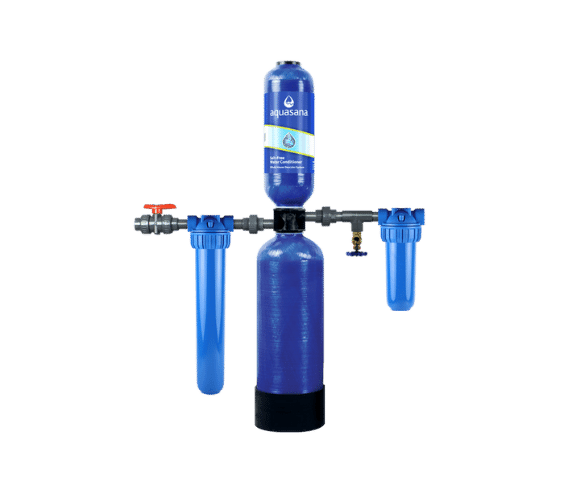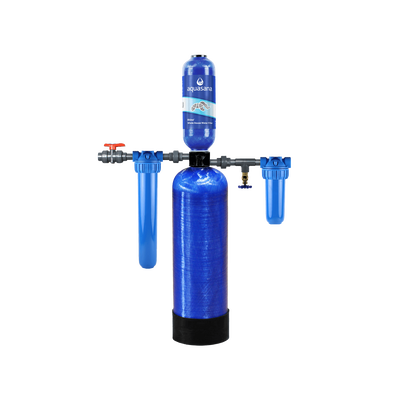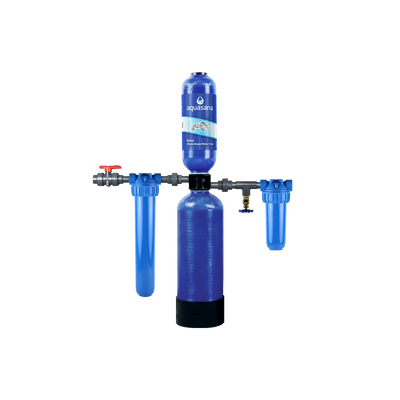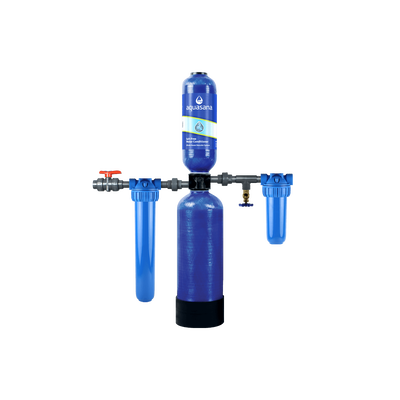What is a water filter?
A water filter or water filtration system helps remove contaminants and dissolved solids from the water you drink, shower, and cook with. In addition to improving the taste and smell of your water, a water filter also has the important job of reducing or removing harmful contaminants from your water that can make it unsafe to drink, such as:
- Metals (Lead, arsenic, copper, etc.)
- Chlorine and chloramine
- Bacteria, viruses, and cysts
- Pesticides, herbicides, and fungicides
- Sediment and particulates
- Microplastics, PFOA/PFOS, and VOCs
There are several types of water filters, such as whole house, under sink, countertop, and shower filters. Additionally, water filters can use a variety of different methods to reduce contaminants.
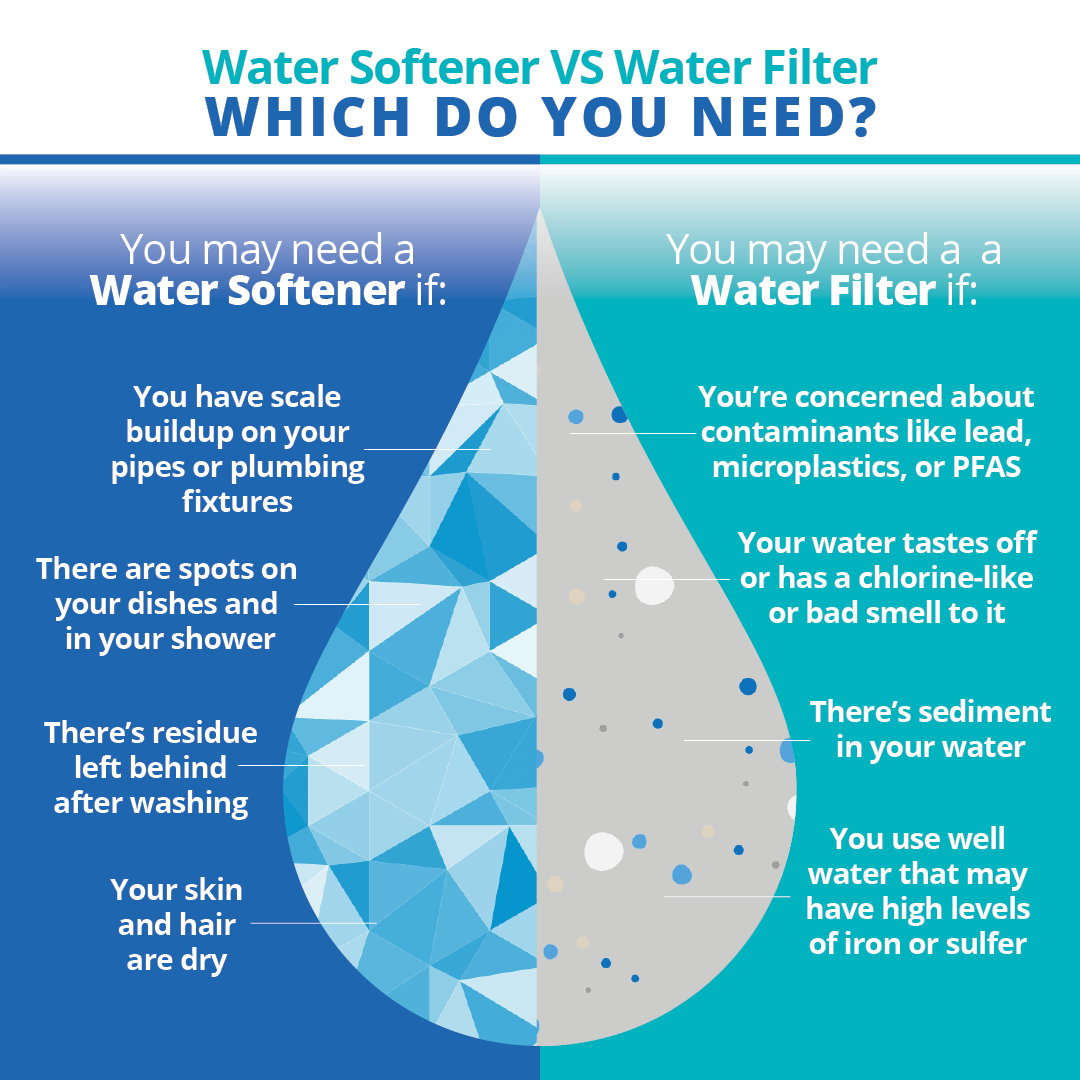
What is a water softener?
Water softeners help to remove minerals such as calcium and magnesium that contribute to hard water. They work somewhat like a chemical magnet using small beads called “ion exchange resin.” The softener has a tank in it with a bed filled with these beads. When the hard water flows through this tank, the hard minerals in the water stick to the beads instead of staying in the water. Once the minerals are stuck to the beads, the water becomes softer since it no longer has the minerals in it. Some softeners include filters that help clean the beads and prepare them to filter more minerals out of the water.
Water softeners are beneficial because they help reduce those horrible rings in your bathtub, soap scum buildup, irritated skin, and clogged pipes. They can also make it easier to wash dishes and clothes, as they help soap to suds up better.
The difference between a water filter and a water softener
Water filters and water softeners are different types of systems that improve water quality, but use distinct processes to address different concerns. Water filters remove contaminants like metals, chemicals, bacteria and sediment that pose health risks. Meanwhile, water softeners remove hard water minerals like calcium and magnesium that aren’t dangerous to your health, but lead to scale buildup in pipes and appliances among other issues for your home.
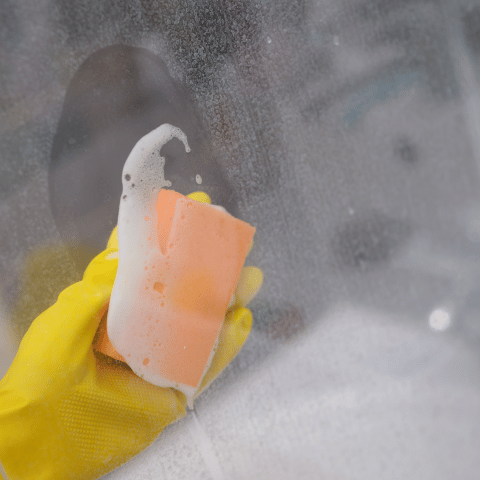
These systems also work in different ways. Water filters feature one or more stages of filtration such as sediment pre-filters, carbon filters, post-filters, and sometimes even UV filters — and contaminants get trapped as water passes through each stage. On the other hand, softeners work through a process called ion exchange using a tank filled with resin beads. As hard water passes over the resin beads, hard mineral ions stick to the beads which allows softened water to go through the system. Both systems will improve your water quality, but they’re intended for different purposes which may lead you to the decision that you only need one, or that you actually need both for complete protection.
Do I need a water filter and a water softener?
Whether you need a water filter and a softener depends on your water hardness and the contaminants that are present. If you have hard water but aren’t worried about contaminants, a softener will address your concerns. Alternatively, if you’re concerned about contaminants but don’t have hard water, you can get by with only a water filter. However, if you have hard water and are concerned about contaminants, this is when you need a water softener and filtration system.
If you have very hard water, you’ll need a salt-based water softener, like our SimplySoft® 40K or 60K grain softeners. If your water isn’t super hard, a Salt-Free Water Conditioner is a great option that requires less maintenance and won’t strip away healthy minerals from your water.
Many people have the misconception that their water is safe and clean simply because they are using a water softener to filter their water. This is an unfortunate misunderstanding. Although a water softener may help to make your water less hard, it does not make it cleaner or safer to drink. Water softeners do not filter water, they only remove calcium and magnesium minerals to address hard water. In order to remove contaminants so water is safer for drinking, cooking, and showering — you’ll need to use a water filter even if you already have a water softener installed. A water filter will remove contaminants that a softener cannot, including chemicals, bacteria, viruses, and cysts that can pose a risk to your health.
Which is better, a water softener or a water filter?
If your goal is only to reduce the presence of harmful contaminants, a water filter is a better solution than a water softener. When your home’s water is run through a quality whole house water filter, you are reducing harmful contaminants like chlorine, chloramines, harmful VOCs, and more.
A whole house water filter will enable you to provide filtered water throughout your entire house, but you can also get clean water through under sink or countertop filters that let you decide where you want to receive filtered water from. Even non-whole house systems have the same contaminant-removing benefits over water softeners. And if you’re wondering if a water filter can make hard water soft, some options like a reverse osmosis water filtration system reduce contaminants and total dissolved solids that contribute to hard water. That being said, a filter can wear out more quickly when filtering hard water. Because of that and because ROs wastewater during the filtration process, using a water softener to solve a hard water issue is a more efficient solution.
Salt-free water conditioners: The alternative to water softeners
If your water is only slightly or moderately hard and you're not concerned about contaminants in your tap water, then a water conditioner might be a viable alternative to a softener.
Water conditioners are less powerful than softeners, require less maintenance and are more eco-friendly because they don't use salt, electricity, and don't generate wastewater. The Aquasana Salt-Free Water Conditioner offers exceptional performance and has a lifespan of up to 1,000,000 gallons or 10 years so you can rest assured that your home is protected. It uses Scale Control Media technology to safely and naturally reduce harsh scale build-up on internal pipes without the use of salt or chemicals. However, it's important to keep in mind that water conditioners typically can’t tackle extremely hard water, in which case you will need a salt-based softener.
To recap, if you have hard water then you need a way to address it. You could use a salt-based water softener, but if your water is only moderately hard, we’d recommend a salt-free water conditioner because it requires less maintenance, is environmentally friendly, and won’t remove healthy minerals from your water.
Water filter vs. water softener takeaway
Just because you use a water softener or conditioner doesn’t mean your water is safe. Most water softeners do not filter contaminants from your water, but they can help with scale buildup. If you struggle with hard water, a water softener or alternative solution is the answer. But if your goal is to remove contaminants and provide clean water, then you’ll need to purchase a water filter. When deciding between a water softener vs. a water filter, consider whether your priority is addressing hard water or contaminants. If both are a concern, you’ll want to invest in a softener and a filter that can work together. If you’re not sure where to start, shop our whole house water filters and water softeners that are compatible with each other and work in unison to protect your home against contaminants and hard water.
WHOLE HOUSE
Salt-Free Water Conditioner
Protect your home's pipes, plumbing, and appliances from scale buildup without the use of harsh chemicals or salt. New and improved system lasts for 10 years.
